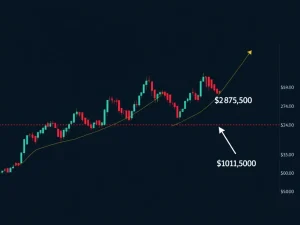Hungary’s Pivotal Blockade: Orbán Halts EU Budget Over Frozen Funds

The European Union faces a critical juncture as Hungary’s Prime Minister Viktor Orbán has once again asserted his nation’s formidable leverage, threatening to derail the bloc’s ambitious €2 trillion seven-year budget. While the geopolitical tremors reverberate across Brussels, cryptocurrency markets, surprisingly, remain unfazed – for now. This high-stakes standoff underscores the complex dynamics of EU governance and the significant power individual member states can wield.
The High-Stakes Hungary EU Budget Standoff
Hungary’s Prime Minister Viktor Orbán made it clear on July 26, 2025, that the approval of the European Union’s new €2 trillion seven-year budget is contingent on the release of funds currently frozen by the EU. This declaration intensifies a long-standing dispute between Budapest and Brussels, leveraging the critical requirement for unanimity in budget ratification among all 27 member states.
Orbán stated, “The approval of the new seven-year budget requires unanimity and until we get the remaining (frozen) funds, there won’t be a new EU budget either.” This move highlights Hungary’s strategic position in shaping EU financial governance, using its veto power as a significant bargaining chip.
Understanding the EU Frozen Funds Controversy
The funds allocated to Hungary have been suspended due to the EU’s conditionality rules. These rules are designed to safeguard the Union’s financial integrity and uphold democratic standards within member states. The primary concerns raised by the EU include issues related to Hungary’s judicial independence and electoral processes.
Key reasons for the funds being frozen:
- Judicial Independence: Concerns over reforms that critics argue undermine the impartiality of Hungary’s courts.
- Rule of Law: Broader issues regarding the application and enforcement of democratic principles.
- Electoral Processes: Questions raised about fairness and transparency in Hungary’s electoral system.
By linking the release of these funds directly to the approval of the new budget, Orbán risks stalling vital EU financial planning, including allocations for economic development, defense projects, and post-pandemic recovery initiatives across the bloc.
Viktor Orbán’s Strategic Leverage: A Familiar Playbook?
This isn’t the first time Viktor Orbán has employed such tactics. In 2023, similar disputes delayed the ratification of the EU’s then-current budget. Historically, Orbán has used budget negotiations to secure favorable terms for Hungary, demonstrating a consistent strategy of asserting national sovereignty against what he perceives as Brussels’ overreach.
However, the current impasse carries heightened stakes. The sheer scale of the €2 trillion budget, coupled with its role in funding critical post-pandemic recovery initiatives, means delays could have far-reaching consequences. These include impacts on:
- Infrastructure development in member states.
- Agricultural subsidies crucial for farmers across the EU.
- Green transition programs vital for climate goals.
This strategy also raises questions about the EU’s ability to balance its commitment to conditionality with political pragmatism, especially when faced with a member state determined to leverage procedural gaps.
Broader EU Financial Planning Implications and Challenges
The standoff poses significant challenges for broader EU financial planning. A prolonged delay in budget approval could ripple across the entire bloc, affecting member states reliant on EU grants for various projects. It underscores a deeper division within the EU:
Centralized Oversight vs. National Autonomy:
- Critics’ View: Orbán’s actions exploit procedural weaknesses, allowing a minority to hold the majority hostage.
- Supporters’ View: This is a defense of national sovereignty and a challenge to perceived overreach from Brussels in domestic governance.
Analysts generally expect a resolution through diplomatic negotiations, given historical precedents. However, the absence of a clear timeline introduces uncertainty for financial markets and could test the cohesion of the Union.
What’s the Cryptocurrency Market Impact?
Despite the significant geopolitical and economic implications of this EU budget standoff, cryptocurrency markets have shown no immediate or significant reaction. This apparent calm can be attributed to several factors:
- Indirect Nature: The dispute is primarily a political and traditional economic issue, not directly tied to blockchain technology or crypto adoption.
- Delayed Effects: Macroeconomic events often have a delayed or indirect impact on crypto, which tends to react more strongly to monetary policy, inflation, or direct regulatory news.
- Market Resilience: Cryptocurrency markets have matured, becoming less volatile to every global political tremor compared to their earlier days.
While the immediate cryptocurrency market impact is limited, a prolonged crisis that destabilizes the Eurozone or global financial systems could eventually trickle down. For now, crypto investors seem to be watching from the sidelines, focused on internal market dynamics rather than the political wrangling in Brussels.
Conclusion
The standoff between Hungary and the European Union over the €2 trillion budget highlights the persistent challenges of consensus-based governance within a diverse bloc. Viktor Orbán’s strategic use of Hungary’s veto power, rooted in the demand for the release of EU frozen funds, has put critical EU financial planning on hold. While the situation underscores the fragility of EU cohesion and the tension between supranational oversight and national autonomy, diplomatic channels are expected to work towards a resolution. For the cryptocurrency world, this remains a distant, though noteworthy, geopolitical event, with its immediate effects seemingly contained. As negotiations unfold, the outcome will undoubtedly shape the future of EU funding and its broader political landscape.
Frequently Asked Questions (FAQs)
1. Why is Hungary blocking the EU’s €2 trillion budget?
Hungary’s Prime Minister Viktor Orbán is blocking the budget to demand the release of frozen EU funds allocated to Hungary. These funds were withheld due to concerns over Hungary’s adherence to rule of law and democratic standards, particularly regarding judicial independence and electoral processes.
2. What are ‘frozen funds’ in the EU context?
‘Frozen funds’ refer to EU disbursements to a member state that have been suspended or withheld. This typically occurs when the European Commission identifies concerns about a country’s compliance with EU conditionality rules, which link funding to respect for democratic values, human rights, and the rule of law.
3. How does Hungary’s action impact other EU member states?
Since the approval of the EU budget requires unanimity among all 27 member states, Hungary’s blockade can delay the entire EU financial planning process. This could affect other member states reliant on EU grants for various programs, including economic development, infrastructure projects, agricultural subsidies, and green transition initiatives.
4. Has Hungary used similar tactics in past EU budget negotiations?
Yes, Hungary has a history of using its veto power in EU budget negotiations to secure concessions. For instance, similar disputes delayed the ratification of the EU’s current budget in 2023, though agreements were eventually reached.
5. Why hasn’t this EU budget standoff significantly impacted cryptocurrency markets?
The immediate cryptocurrency market impact has been limited because the dispute is primarily a geopolitical and traditional economic issue, not directly related to crypto technology or adoption. While major macroeconomic events can influence crypto, the market often shows a delayed or indirect reaction to such political standoffs, focusing more on internal dynamics or direct regulatory news.
6. What is the likely resolution to this standoff?
Analysts suggest the conflict will likely resolve through diplomatic negotiations, as has been the case in past disputes. Both sides have an interest in reaching an agreement to avoid prolonged financial uncertainty, though the timeline for a resolution remains uncertain.









